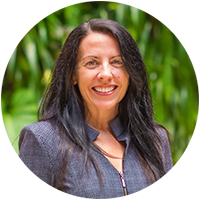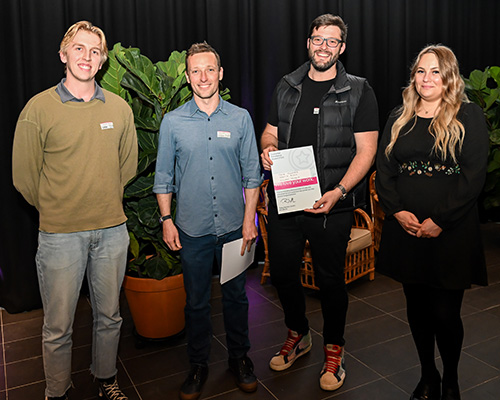Lessons for a lifetime:
From sending virtual beers to senior leadership –
executive shares why he still uses the lessons
from his first job in retail
Pete Masters’ career isn’t short of unconventional twists – from working in a London startup that delivered loyalty programs, including sending a ‘virtual beer’ to friends, to now leading the referrals program within Unloan, CommBank's innovator for digital home loans.
“I’ve learned so much from working in startups and small businesses at the start of my career,” Pete said.
“I really enjoy the challenge that comes with working in tech and entrepreneurship, including my own ventures; no two days are ever the same. Being in businesses that are smaller or leaner means that you need to be more inventive in your day-to-day to get things done.”
Pete took his tech and entrepreneurship background, which has centred around creating and fostering virtual relationships and transitioned it into the “intrapreneur” side of large corporations.
Unloan is an example of this, sitting within CommBank’s venture scaler, ‘x15ventures’. Before his role at Unloan, Pete was a team manager at Doshii, another one of x15’s ventures.
“They operate as individual ventures but are owned and supported by the parent company. I feel I’ve found the sweet spot, enjoying the fast pace of an entrepreneurial-based environment within a large organisation,” Pete said.
“As the leader of the Unloan Referrals Program, I’m responsible for its delivery, which includes developing all aspects of the program, from policies and procedures, to workflows, training and onboarding, as well as working to build strong relationships with our referrers and their customers.”
Yet, the UQ Bachelor of Business and Commerce alum shares that before the bright lights of London or the colourful corporate world, he was already armed with some vital life lessons from his very first role in retail.
“I’ve learned so much from every role I’ve been in, but some of the best lessons that I carry with me to this day are from my first paid job at the Telstra retail shop in Brisbane,” Pete said.
“I was 17 and skipped Schoolies to beat the Christmas casual rush of applications. I started at Telstra the week after I finished school and continued to work there while I went to university at UQ.
“A key responsibility was to sell landline, mobile and internet connections to people, helping them understand how it all worked, and which plan or product was the best value for their needs.
“Often, coming into a Telstra retail shop was a last resort when a customer couldn’t get a resolution over the phone, so we also did a lot of troubleshooting, fixed bills and really honed our dispute resolution skills with some pretty animated in-store customer interactions.
Pete shared the top 4 lessons he learned from his first job that have helped his career and benefitted his workplaces.
Pete's top 4 lessons from his first job
 1. Get to know the structure and who’s who in the zoo
1. Get to know the structure and who’s who in the zoo
Telstra has so many departments – sales, billing, activations, loyalty, and more – across landline, mobile, Bigpond and Foxtel. Knowing what each of them did and how to get them on the phone quickly meant that I could solve things faster, and that built trust with my customers.
In truth, I learned the system and then made it work for my customers. The faster you can understand the system of your workplace, i.e. who’s who, how they connect, what they’re trying to achieve and where you (and your role) fit in it, the easier it will be to contribute effectively to your workplace.
 2. Sales is listening to your customer
2. Sales is listening to your customer
At the Telstra store at Indooroopilly, we used to have 30+ demonstration phones down the wall as you walked in. When I started, I thought my role in sales was to ‘sell’ one of these phones to the person who just walked into the shop (remembering that this was in 2004 – no such thing as internet on your phone).
I thought working in sales meant pushing a product onto someone and getting them to buy it. Over the 5 years I worked there, I realised it was about simplifying that wall of choice. I learned to listen to my customer, play back what’s important to them, give them a choice (including pros/cons) and importantly, to ask for the sale. I still use modified versions of this today.
 3. Customer service makes or breaks your brand
3. Customer service makes or breaks your brand
One Christmas I was working, an older gentleman walked into the store and was adamant about disconnecting his home phone. I took him through the process and completed the disconnection. One week later, he returned and said to me, “You’re the first person in Telstra to get anything to work for me,” and asked me to reconnect his home phone, which I did.
He came in again 2 weeks later with a gift, telling me how thankful he was to have someone who was able to follow through. The experience taught me that even the smallest of actions can have the biggest impact for your customers. In business, this can translate into customer retention, loyalty and even advocacy, especially when you’re working in a small business or startups.
 4. Keep cool under pressure
4. Keep cool under pressure
I will forever remember the time when a customer walked into the store, past the queue and slammed down their bill and told me, “Fix it!” An imposing figure, ready for a dispute. Your heart skips a beat as you work out what to do next. Ensuring that I stayed calm while I listened to their complaint, I proposed how I was going to rectify the issue and got their permission to do it that way.
With their buy-in to a step-by-step solution, I was able to de-escalate their emotional state – and ultimately solve their issue. People have emotions and sometimes they spill over into the workplace. Telstra taught me the importance of remaining calm and compassionate in the face of anger or frustration.
Why are first jobs in customer service so valuable?
Many Australians work in a customer-facing role at some point in their lives, whether in retail, hospitality or even at a call centre. Customer service is the heartbeat of many businesses, and often an appealing option for a casual or part-time first job, fitting well around school and university commitments.
So, what makes a customer experience role particularly valuable in the lessons it imparts in a first job? And why do those lessons resonate so many years later?

UQ MBA and Executive Education Director, Associate Professor Nicole Hartley, has research expertise in customer experience and is also part of the Service Innovation Alliance in the Business School. She shares her top 3 reasons why customer service roles provide rich learning opportunities that stick with many throughout their careers.
1. Roles that focus on customers as key stakeholders not only hone interpersonal skills essential for effective communication, but they also highlight the importance of being open to and mindful of others’ perspectives.
2. Customer service in areas such as retail often involves managing various tasks simultaneously, which helps develop and refine time management skills and the ability to remain adaptive and responsive to changing environments focused on delivering value.
3. Customer service environments frequently require quick decision-making and the effective resolution of customer issues. These environments demand strong negotiation and problem-solving skills, which are vital for future roles focused on managing teams, clients and other stakeholders.
Discover how your business can exceed expectations by partnering with experts from the Service Innovation Alliance
 Associate Professor Nicole Hartley
Associate Professor Nicole Hartley
Associate Professor Nicole Hartley Hartley is the MBA and Executive Education Director at UQ Business School and a researcher of UQ’s Service Innovation Alliance. Nicole is a leadership expert and an internationally recognised research academic in the field of services marketing and digital technology.


